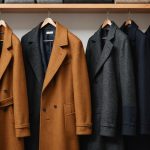Exploring the Cutting-Edge of Ethical Fashion Trends for Conscious Shoppers in the UK
In recent years, the fashion industry has undergone a significant transformation, driven by the growing awareness of its environmental, social, and ethical impacts. For conscious shoppers in the UK, the quest for sustainable and ethical fashion has become a top priority. Here, we delve into the latest trends, innovative practices, and pioneering brands that are redefining the fashion industry.
Understanding Sustainability in Fashion
Sustainability in fashion is a multifaceted concept that encompasses environmental, social, and governance (ESG) factors. It involves creating clothing that is not only stylish but also ethically produced and eco-friendly. Here are some key ESG factors driving this change:
Also to read : Jewelers and jewelry stores in Montreal: crafting timeless elegance
Environmental Factors
- Cutting Down Waste: Reducing textile waste is a critical aspect of sustainable fashion. Brands are adopting circular models that promote reuse, repair, resale, and upcycling of clothing.
- Eco-Friendly Materials: The use of sustainable materials such as organic cotton, recycled fabrics, and vegan leathers is on the rise. These materials lower the environmental impact by reducing the use of harmful chemicals and non-renewable resources.
- Lowering GHG Emissions: Brands are focusing on reducing their carbon footprint through energy-efficient practices, renewable energy sources, and responsible supply chain management.
Social Factors
- Fair Wages and Safe Workplaces: Ensuring fair labor practices is crucial. Brands are committed to providing safe workplaces and fair wages to their workers, contributing to the well-being of communities involved in the production process.
- Community Support: Many sustainable fashion brands engage in community development programs, supporting local artisans and promoting fair trade practices.
Governance
- Ethical Choices and Transparency: Sustainable fashion brands prioritize ethical decision-making and transparency. This includes being open about their supply chains, production processes, and environmental impact.
- Responsibility: Brands are taking responsibility for their actions, committing to long-term sustainability goals and continuous improvement.
Key Areas of Focus for Sustainable Fashion
Several strategies and practices are driving the sustainability agenda in the fashion industry.
Sustainable Materials and Sourcing
Sustainable materials are at the heart of ethical fashion. Here are some examples:
Also read : Master the Art of Edgy Necklace Layering: Top Tips for a Chic UK Style!
- Organic Cotton: Grown without the use of toxic pesticides or synthetic fertilizers, organic cotton is a healthier choice for both the environment and the farmers.
- Recycled Fabrics: Using recycled materials reduces the need for new raw materials and helps in minimizing waste.
- Vegan Leathers: Alternatives like VEGEA, a grape-based vegan leather, and Mylo, a mycelium-based leather, are gaining popularity for their eco-friendly and cruelty-free credentials.
Circular Fashion & Slow Fashion
The shift from fast fashion to slow fashion is a significant trend. Here’s how brands are embracing circular models:
- Reuse, Repair, Resale: Brands like Stella McCartney and Reformation are promoting the reuse, repair, and resale of clothing to extend its lifespan and reduce waste.
- Upcycling: Transforming old or discarded materials into new, higher-value products is another strategy to reduce textile waste.
Case Studies: Sustainable Fashion Brands Leading the Way
Several brands are setting the standard for sustainable fashion.
Stella McCartney
Stella McCartney is a pioneer in sustainable luxury fashion. Here are some of their innovative practices:
- Sustainable Materials: The brand uses materials like Savian (a plant-based fur alternative), NATIVA™ wool (sourced through regenerative farming), and Kelsun™ (a seaweed fabric).
- Energy Efficiency: All new Stella McCartney stores are lit with energy-efficient LED lighting, and their flagship store and head office run entirely on renewable energy.
- Packaging and Waste: The brand has eliminated PVC and committed to using only recycled, recyclable, or compostable plastics by 2025.
Reformation
Reformation is another brand that has made significant strides in sustainability:
- Extended Sizing: Reformation offers an Extended Sizing collection, featuring their best-selling pieces in plus sizes up to UK 28, promoting inclusivity and diversity.
- Sustainable Practices: The brand focuses on using eco-friendly materials, reducing water usage, and implementing responsible waste management.
Everlane
Everlane is known for its radical transparency and commitment to sustainability:
- Transparent Pricing: Everlane openly shares the cost breakdown of each product, including materials, labor, and company markup.
- Sustainable Materials: The brand aims to use 100% certified recycled, organic, renewable, and responsibly sourced materials by 2025.
Size Inclusivity in Sustainable Fashion
Size inclusivity is an essential aspect of ethical fashion, ensuring that sustainable clothing is accessible to all body types.
Challenges and Opportunities
Historically, sustainable fashion brands have often fallen short in offering inclusive sizing, limiting options for plus-size consumers. However, there is a growing trend towards more inclusive sizing:
- Reformation: Offers an Extended Sizing collection up to UK 28.
- Loud Bodies: Provides custom orders for atypical body shapes and offers sizes up to 10XL.
- Everlane: Offers sizes up to UK 26 and promotes radical transparency in their sizing and pricing.
Brands Leading the Way in Inclusivity
Here are some brands that are making significant strides in size inclusivity:
- Seams Friendly: Offers customizable clothing up to 16XL and beyond, focusing on utility and function.
- Lucy & Yak: Expanded their sizing to include UK 32 and promotes a circular fashion model.
- Pana Mina: Focuses on cultural craftsmanship and offers a size-inclusive line up to 4XL.
The Rise of Secondhand Fashion
Secondhand fashion is gaining momentum, driven by eco-conscious consumers and the desire for affordability.
Consumer Trends
- Generational Preferences: Younger generations, such as Gen Z and Millennials, are driving the trend towards secondhand fashion due to its eco-friendly and affordable nature.
- Popular Platforms: eBay, Vinted, and Etsy are among the most preferred platforms for buying secondhand clothing in the UK.
Impact on the Environment
- Reducing Waste: Buying secondhand reduces the demand for new, resource-intensive clothing and helps in minimizing textile waste.
- Carbon Emissions: Secondhand shopping lowers carbon emissions associated with the production, transportation, and packaging of new clothing.
Leading Secondhand Initiatives
Online fashion retailers are integrating secondhand features into their platforms:
- eBay: The most popular platform for secondhand buying in the UK, with 62% of respondents preferring it.
- Vinted and Etsy: These platforms are also highly popular, offering a wide range of pre-owned clothing and accessories.
Practical Insights and Actionable Advice for Consumers
For consumers looking to adopt more sustainable and ethical fashion practices, here are some practical tips:
Choose Sustainable Materials
- Opt for clothing made from organic cotton, recycled fabrics, and eco-friendly materials.
- Consider vegan alternatives to leather and fur.
Adopt Circular Fashion Practices
- Buy secondhand clothing from platforms like eBay, Vinted, and Etsy.
- Participate in clothing swaps and repair old clothes instead of discarding them.
Support Ethical Brands
- Look for brands that prioritize fair labor practices, transparency, and environmental sustainability.
- Check for certifications like Fair Trade and Organic Cotton.
Reduce Waste
- Avoid fast fashion and opt for high-quality, long-lasting clothing.
- Upcycle or repurpose old clothes to give them a new life.
Table: Comparing Sustainable Fashion Brands
Here is a comparative table highlighting some of the key sustainable fashion brands in the UK:
| Brand | Sustainable Materials | Size Inclusivity | Circular Fashion Practices | Transparency and Governance |
|---|---|---|---|---|
| Stella McCartney | Savian, NATIVA™ wool, Kelsun™ | Limited | Reuse, repair, resale | High transparency, renewable energy |
| Reformation | Eco-friendly materials | Up to UK 28 | Reuse, repair, resale | Responsible waste management |
| Everlane | Certified recycled materials | Up to UK 26 | – | Radical transparency |
| Seams Friendly | Organic cotton, linen | Up to 16XL | Custom orders | Focus on utility and function |
| Lucy & Yak | Eco-friendly materials | Up to UK 32 | Circular fashion model | Encourages secondhand shopping |
| Pana Mina | Eco-friendly materials | Up to 4XL | Fair trade practices | Cultural craftsmanship |
Quotes from Industry Experts
- “Sustainability in fashion is not just about the materials we use, but also about the entire lifecycle of the product, from production to end-of-life.” – Stella McCartney.
- “Our goal is to make sustainable fashion accessible to everyone. We believe that fashion should be a force for good, not harm.” – Reformation.
- “Transparency is key in sustainable fashion. Consumers have the right to know how their clothes are made and the impact they have on the environment.” – Everlane.
The fashion industry is at a crossroads, with sustainable and ethical fashion trends gaining unprecedented momentum. As consumers become more aware of the environmental and social impacts of their purchasing decisions, the demand for sustainable fashion is set to continue growing. By choosing sustainable materials, adopting circular fashion practices, supporting ethical brands, and reducing waste, consumers can play a crucial role in transforming the fashion industry.
In the words of Stella McCartney, “The future of fashion is sustainable fashion.” As we move forward, it is clear that sustainability will be at the forefront of fashion trends, shaping a more conscious and responsible industry for generations to come.











